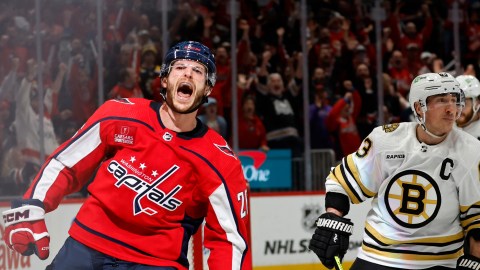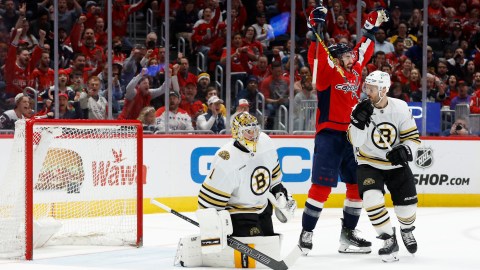 Every team deals with injuries during an NHL season. It just so happens that the Bruins are dealing with all of them at once.
Every team deals with injuries during an NHL season. It just so happens that the Bruins are dealing with all of them at once.
Over one mid-December week, the number of Bruins players lost to injury increased exponentially: since-returned Johnny Boychuk (back), Loui Eriksson (concussion), Chris Kelly (ankle), Dougie Hamilton (lower body) and Daniel Paille (upper body). The team is also dealing with long-term absences from players like Adam McQuaid. Recent call-ups Kevan Miller, Ryan Spooner and Matt Fraser have performed well in their time with the big club, but if head coach Claude Julien expects any kind of top spot in the much-improved Atlantic Division, he’ll have to lean not on this impressive corp of rookies, but his veterans.
Unfortunately, with several Bruins having already played themselves onto Olympic rosters, this could spell disaster for a team with expectations of postseason success.
A number of Bruins are all but locks to play under their home nations’ flags for the 2014 Winter Olympics in Sochi, Russia. Tuukka Rask is not only the best Finnish goalie in the game today, but one of the best in the world — likewise with Slovakian Zdeno Chara on the blue line. David Krejci was the top-line center for the Czech Republic in Vancouver in 2010, and, if he can make it back from injury, Eriksson can continue his role as a mainstay of the impressive Swedish national system since 2003.
It’s safe to say that, if healthy, all of those players will be forgoing a two-week vacation to play an intensely competitive international tournament in Sochi.
Add to that contingent Patrice Bergeron, who, despite his relative lack of offensive flash in comparison to the rest of Team Canada’s hopefuls, has been bandied about as the True North’s best defensive forward and a very likely pick to don his nation’s not-at-all-ugly Olympic sweaters. Veteran Jarome Iginla may also be pegged to add some experience to Team Canada, while Milan Lucic might be called on for some much-needed muscle.
Finally, Carl Soderberg (Sweden) and Torey Krug (USA), both long shots for Olympic consideration before the NHL season began, may have both played themselves into a spot on their national rosters.
All this means that at least four and as many as nine Bruins may be giving their all in Sochi, rather than resting for two weeks at home — a serious exertion that, given the recent spate of injuries, may prove costly late in the season and playoffs.
The Bruins played as late in the 2013 lockout-shortened season as any other team in the league. They haven’t been affixed with the “Stanley Cup hangover” moniker because they came just two games short of actually winning the trophy, but the effects of playing hockey well into June and then starting a full 82-game season mere months later can’t be ignored. Fatigue affects every team in the league, but with their long run through last season’s playoffs, count on it to be twice as tough for the Bruins as their 2013-14 campaign drags on.
So what is Julien to do with a group of players possibly already nearing overextension, and most of whom are set to compete in a mini-playoff halfway through the season? Could he lean on his less experienced players to carry the load as the team approaches the Olympic break?
While his rookies have been surprisingly effective, thrusting players like Reilly Smith and Matt Bartkowski into more prominent roles to save his veteran core some ice time is something Julien can ill afford to do in the Atlantic Division, where the Bruins hold only a three-point lead over the Montreal Canadiens. The surprise success story of Ben Bishop and the Tampa Bay Lightning — both pre- and post-Steven Stamkos’ injury — has added another team to the division mix. Not that he would ever consider it, but Julien does not have the points cushion within the division to ease the burden on his Olympic-bound players. They have to play hard while they’re here to keep what little lead the team has.
The logical answer to this problem is not for the Bruins to adapt to the intrusion of the Olympics, but rather to ignore the games altogether. After all, if fatigue is the issue, a two-week break in February might be exactly what this team needs to rest up and recuperate from its recent dearth of injuries.
Unfortunately for Julien, hockey players are a competitive bunch. Given the chance in any normal Olympic cycle, most players would jump at the opportunity to play under their nation’s banner anyway. But considering that the Sochi Olympics are likely to be the last Olympiad to which the NHL and commissioner Gary Bettman will agree to send their products — rather, players — many may see Sochi as their last chance for international glory. Bettman has already begun his appropriately political support of a league-run “World Cup of Hockey” that would take place in the summer outside the confines of the regular season, a la MLB’s World Baseball Classic.
Julien really is stuck. He can’t baby his players into the Olympic break — he just doesn’t have the points to do it. He can’t force his players to take a break and skip the Olympics — it’ll likely be the last chance they’ll have to compete on such a stage. He can’t ride them as hard as usual — between Sochi and the long playoff run last year, they won’t have the legs come the playoffs.
This Olympic-sized problem may shape up to spell disaster for the Bruins come spring. Fatigue is unavoidable in an 82-game regular season, but Julien will have to do his best to avoid the brunt of it.
That is, if he doesn’t burn himself out on Team Canada’s bench either.



